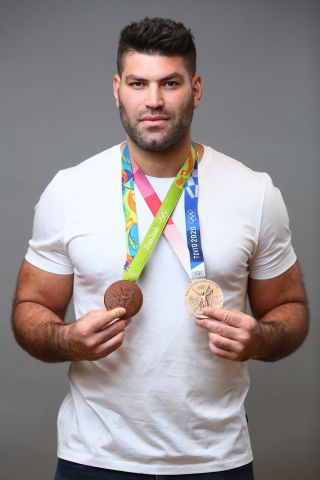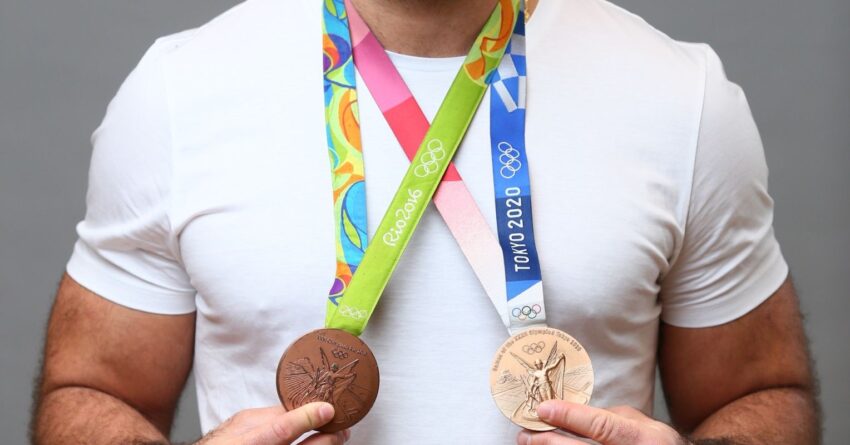When Ori Sasson was eight years old, he participated in his first judo competition. Sitting in the back of his father’s car, he experienced crippling anxiety for the first time. He hadn’t been able to eat his breakfast before leaving home, and he spent the journey praying for traffic to prevent them from arriving in time for his fight.
Arriving at the venue, Sasson joined the other competitors who were warming up but found that his legs felt so heavy he couldn’t run.
His first fight didn’t last long: Within 10 seconds he was flat on his back and on the way to an early exit.
Despite this early experience and the feeling that he didn’t belong in the sport, Sasson persevered. He battled his anxiety, which often left him feeling frozen in fights, to go on to become the first Israeli fighter to win medals at two Olympic Games.

Source: Ori Sasson / Used with permission
Sasson was determined to overcome his anxiety and prove himself to those who had written him off. People had said that he was a talented judo fighter but a quitter.
Sasson explained, “Every day before I went to sleep, I was dreaming about the Olympic podium, even though I was so far from that point. I was very hungry to show the world who I am, and that was even more important for me. I didn’t know that it was going to be so hard and so challenging, but I was ready for it.”
His elder brother’s success in the same sport helped to motivate the young Ori. A future Israeli national champion and European Under 20 champion, he was Ori’s first role model and supported Ori’s development all the way. He was alongside Ori during that traumatic first fight and the brothers later shared a room together at the National Olympic Centre as they competed on the global stage.
“I felt ashamed right after the match, he was there, he wanted to show everyone that his brother was also good. I think that was in my mind. Sometimes we have visions and we think that our vision is true, but it’s not always true, especially when we are anxious. Anxiety changes your whole mindset.
“Right after the match, he came and he told me, ‘If you want to be a champion one day, if you want to go to the Olympics, you have to learn that failure is a part of the game, and it’s going to be tough and you’re going to have dark days, but it’s worth it.’
“The next day, I woke up, I went to train and I started to change my mindset as a kid. I still felt like I was frozen and anxiety was in my way. But he was there always as well.”
With his brother’s support, Ori pushed forward with his judo, finding different tools to adapt to his anxiety. He shared three of his key tools:
- Ori realised that he needed to become mentally tougher during fights. He started working with a sports psychologist at the age of 22. Through his training, he learned techniques such as using body language and self-talk to build his strength and confidence in judo. Ori said, “I had to learn how to control my thoughts and clear from my mind what others think. I worked on my self-talk and used body language to project confidence.”
- Ori also developed coping mechanisms for when he felt tired or weak during training. He changed his attitude and pushed himself to keep going. He even used techniques like screaming to motivate himself and improve his confidence. Ori emphasised the importance of mental strength and discipline, stating, “You have to be mentally strong to push through those tough moments. It’s about changing your attitude and pushing yourself even when you feel like giving up.”
- Furthermore, Ori kept a journal to reflect on his training sessions and provide mental and physical feedback. This journal served as a tool for self-reflection and improvement. Ori explained, “I would write down how I felt during training, what worked and what didn’t. It helped me analyse my performance and make adjustments.”
These tools helped Ori cope with his anxiety and become mentally strong in his professional career. He utilized a combination of mindset techniques, self-reflection, and support from his brother and a sports psychologist to overcome his fears and achieve his full potential.
After retiring from judo, Ori has moved onto one of the most anxiety-inducing professions for most people—he has gone on to become a motivational speaker, working with business leaders to help them overcome their own anxiety and perform at the top level.
“When I speak in front of people, of course I’m standing backstage and thinking to myself, ‘Maybe they aren’t going to like it, they aren’t going to listen to me, am I good enough?’ But then I remind myself of all the tools I’ve learned. I can’t afford not to use those tools. I’m speaking about those tools.
“What I realised is that, in some situations, a voice tells me, ‘Don’t take the risk’; I don’t need to listen to him. Now I’m always more afraid of not taking risks. That makes me much more scared, because then I know that I’m not going to grow.”
